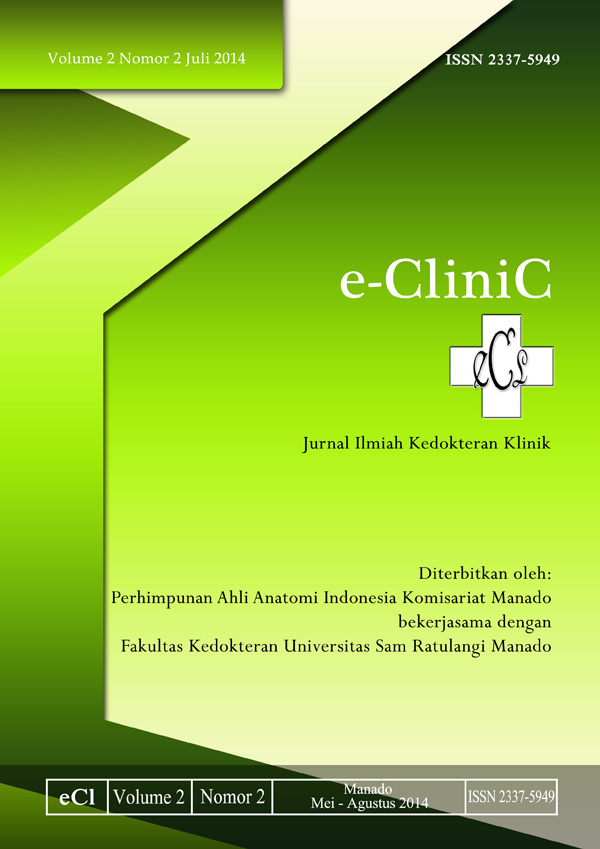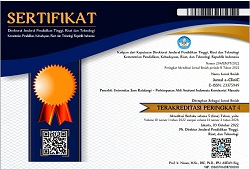HUBUNGAN TINGKAT PENGETAHUAN DAN SIKAP MENJAGA KEBERSIHAN GENITALIA EKSTERNA DENGAN KEJADIAN KEPUTIHAN PATOLOGIS PADA SISWI DI SMA NEGERI 1 MANADO
DOI:
https://doi.org/10.35790/ecl.v2i2.5708Abstract
Abstract: All women may experience vaginal discharge according to the data on women’s reproductive health research shows 75 % of women in the world would suffer from vaginal discharge, at least once in her life. Bad attitude in maintaining genital hygiene, such as washing with dirty water, wear rinse excessively, use pants that do not absorb sweat, change underwear rarely, change pads rarely can trigger the onset of the infection that causes vaginal discharge. The purpose of this study is to determine the correlation of the level of the knowledge and attitude of maintaining the external genitalia with pathological vaginal discharge event on schoolgirl in SMA Negeri 1 Manado on 2012. Methods: The type of this research is observational analytic studies with cross sectional design. Subject of this research is 106 class XII schoolgirl of SMA Negeri 1 Manado 2012 – 2013. Data were collected by questionnaires which have been tested. Results: Schoolgirl who have had vaginal discharge is obtained as 35,8 % and who haven’t as 64,2 %. Knowledge of schoolgirl who have had vaginal discharge 24,6 % included in good category and on schoolgirl who haven’t had vaginal discharge 75,4 % included in good category. Attitude of schoolgirl who have had vaginal discharge 29,6 % included in supportive category and of schoolgirl who haven’t had vaginal discharge 70,4 % included in supportive category. Conclusion: According to the result of the research, knowledge and attitude of maintaining the cleanliness of the external genitalia are related with pathological vaginal discharge events. Bad knowledge about maintaining the cleanliness of the external genitalia increase the risk of experiencing vaginal discharge by 2,304 times. Meanwhile, attitude that does not support manitaining cleanliness of the external genitalia increase the risk of experiencing vaginal discharge by 1,89 times.
Keywords: Knowledge, attitude, pathological vaginal discharge.
Â
Â
Abstrak: Semua wanita dapat mengalami keputihan berdasarkan data penelitian tentang kesehatan reproduksi wanita menunjukan 75% wanita didunia pasti menderita keputihan, paling tidak sekali dalam hidupnya. Sikap buruk dalam menjaga kebersihan genitalia, seperti mencucinya dengan air kotor, memakai pembilas secara berlebihan, menggunakan celana yang tidak menyerap keringat, jarang mengganti celana dalam, tak sering mengganti pembalut dapat menjadi pencetus timbulnya infeksi yang menyebabkan keputihan tersebut. Tujuan dari penelitian ini untuk mengetahui hubungan tingkat pengetahuan dan sikap menjaga kebersihan genitalia eksterna dengan kejadian keputihan patologis pada siswi di SMA Negeri 1 Manado tahun 2012. Metode: Jenis penelitian adalah penelitian analitik observasional dengan rancangan cross sectional. Subjek penelitian ini adalah 106 siswi kelas XII SMA Negeri 1 Manado periode 2012-2013. Pengambilan data dilakukan dengan pengisian kuesioner yang telah diuji cobakan. Hasil: Siswi yang pernah mengalami keputihan didapatkan sebanyak 35,8 % dan yang tidak pernah 64,2 %. Pengetahuan siswi yang pernah mengalami keputihan 24,6 % masuk dalam kategori baik dan pada siswi yang tidak pernah mengalami keputihan 75,4 % masuk dalam kategori baik. Sikap siswi yang mengalami keputihan 29,6 % masuk dalam kategori mendukung dan pada siswi yang tidak pernah mengalami keputihan 70,4 % masuk dalam kategori mendukung. Simpulan: Berdasarkan hasil penelitian, pengetahuan dan sikap menjaga kebersihan genitalia eksterna berhubungan dengan kejadian keputihan patologis. Pengetahuan buruk mengenai kebersihan genitalia eksterna meningkatkan resiko mengalami keputihan sebesar 2,304 kali. Sementara itu, sikap yang tidak mendukung menjaga kebersihan genitalia eksterna meningkatkan resiko mengalami keputihan sebesar 1,89 kali.
Kata kunci: Pengetahuan, sikap, keputihan patologis.
Downloads
How to Cite
Issue
Section
License
COPYRIGHT
Authors who publish with this journal agree to the following terms:
Authors hold their copyright and grant this journal the privilege of first publication, with the work simultaneously licensed under a Creative Commons Attribution License that permits others to impart the work with an acknowledgment of the work's origin and initial publication by this journal.
Authors can enter into separate or additional contractual arrangements for the non-exclusive distribution of the journal's published version of the work (for example, post it to an institutional repository or publish it in a book), with an acknowledgment of its underlying publication in this journal.
Authors are permitted and encouraged to post their work online (for example, in institutional repositories or on their website) as it can lead to productive exchanges, as well as earlier and greater citation of the published work (See The Effect of Open Access).







